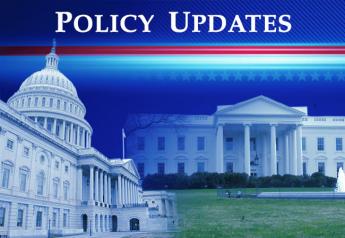President Biden to Deliver Remarks on Terrorist Attacks in Israel

China mulls new stimulus, higher deficit | IMF forecasts | Ukraine farmland abandonment
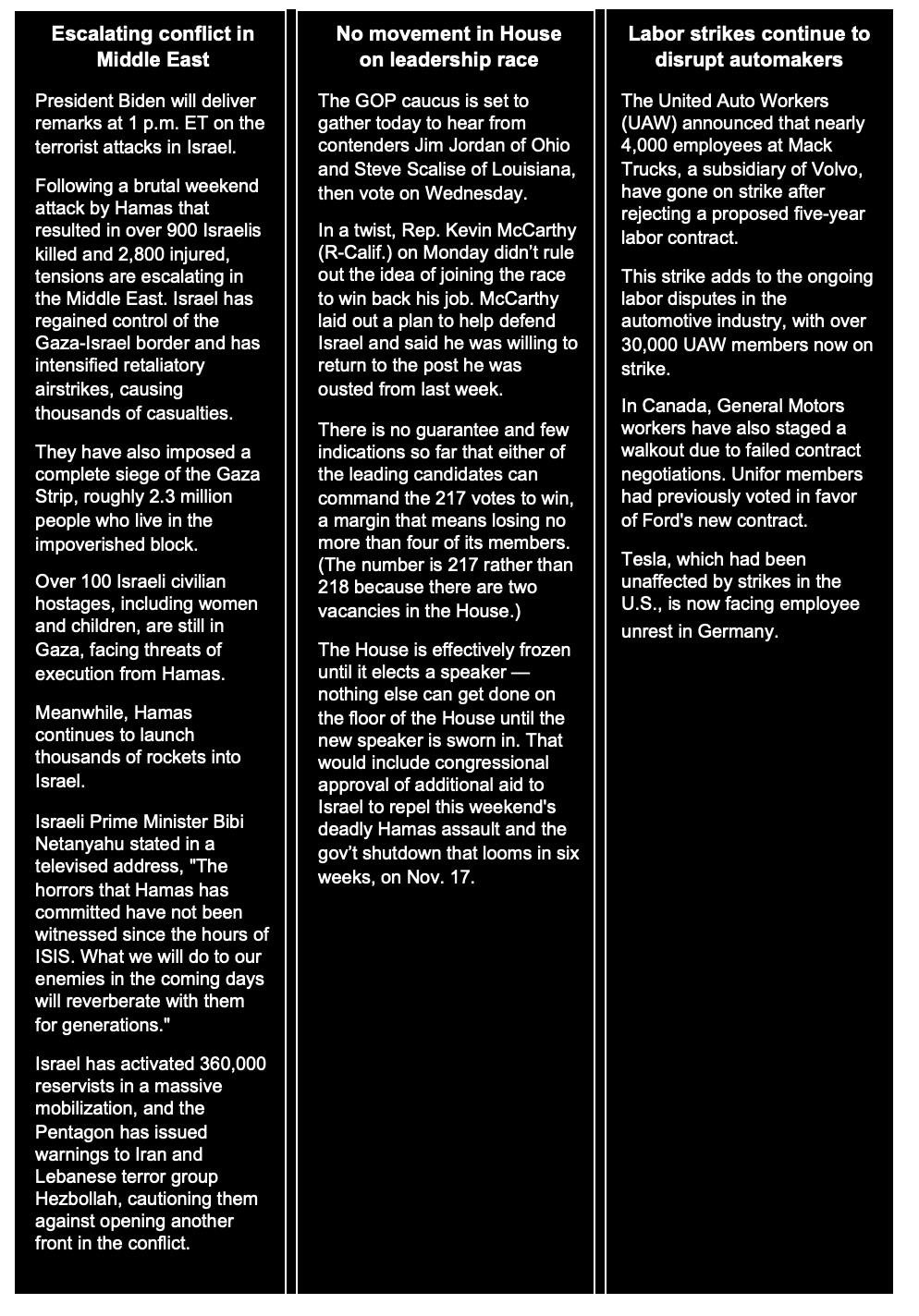
|
Today’s Digital Newspaper |
MARKET FOCUS
- Yellen tells FT the rise in bond yields has not created dysfunction in U.S. bond markets
- Iranian oil barrels have provided a "relief valve” for oil demand
- IMF urges central banks to keep grip on monetary policy as it raises global inflation
- IMF slightly lowered its forecast for global growth next year to 2.9%
- IMF revised down its growth projections for China and the Eurozone
- Fed's caution grows as bond market signals possible end to rate hikes
- U.S. households hold $1 trillion in excess savings
- IEA predicts slower growth in global natural gas demand thru 2026, focus on China
- Iron ore prices have been rising despite challenges in China's property market
- Ag markets today
- Ag trade update
- World grain output increased
- NWS weather outlook
- Pro Farmer First Thing Today items
ISRAEL/HAMAS CONFLICT
- Israel discovers 1,500 Hamas militant bodies; tensions escalate in Gaza conflict
- U.S. lawmakers propose joint aid package for Israel and Ukraine, but face backlash
- Fertilizer makers surge amid concerns over impact of Israel conflict on global supplies
RUSSIA & UKRAINE
- U.S. prepares crackdown on evasion of sanctioned Russian oil price cap
- U.N. held talks in Russia regarding grain, fertilizer exports
- Ukraine’s winter wheat seedings pass halfway point
- Russian court upheld detention of WSJ reporter Evan Gershkovich
- Ukraine farmland abandoned in war
POLICY
- Potential tax changes as 2017 cuts approach expiration
CHINA
- China's Commerce minister expresses concerns over trade and tech restrictions
- China mulls new stimulus, higher deficit to meet growth goal
- Country Garden may not meet all its offshore debt obligations
TRADE POLICY
- Export restrictions imposed by economies on food, feed and fertilizers are still high
- GOP lawmakers urge Biden admin. to halt proposed tariff increase on Russian fertilizer
LIVESTOCK & FOOD INDUSTRY
- California Governor signs bill banning several food chemicals
- Smithfield to close North Carolina plant but transfer production to another site
- U.S. pork exports maintain steady performance, led by strong demand in Mexico
- U.S. beef exports show improvement in August
POLITICS & ELECTIONS
- Former Dodgers star Steve Garvey enters U.S. Senate race
- As expected, Robert Kennedy Jr. is running for president as an independent
- Hurd drops out of 2024 Republican presidential race and endorses Haley
CONGRESS
- House speaker race has no clear favorite as GOP tensions rise
OTHER ITEMS OF NOTE
- Biden interviewed as part of an investigation into his handling of classified documents
- Today’s calendar of events
|
MARKET FOCUS |
— Equities today: Asian and European stocks were mostly higher overnight. U.S. opend up around 100 points. In Asia, Japan +2.5%. Hong Kong +0.7%. China -0.7%. India +0.9%. In Europe, at midday, London +1.6%. Paris +1.6%. Frankfurt +1.8%.
U.S. equities yesterday: All three major indices opened the week with gains as they lifted into positive territory in the afternoon despite starting lower on increased geopolitical tensions. The Dow rose 197.07 points, 0.59%, at 33,604.65. The Nasdaq was up 52.90 points, 0.39%, at 13,484.62. The S&P 500 ended up 27.16 points, 0.63%, at 4,335.66.
— Agriculture markets yesterday:
- Corn: December corn fell 3 3/4 cents to $4.88 1/4, near the session low.
- Soy complex: November soybean futures fell 1 3/4 cents to $12.64 1/4 after trading in a volatile session. December soybean meal futures rose $2.50 before settling at $374.60. December soybean oil fell 142 points to 53.93 cents.
- Wheat: December SRW wheat rose 4 1/2 cents to $5.72 3/4 and nearer the session low. December HRW wheat closed up 12 1/4 cents at $6.86 and nearer the session high. December spring wheat futures rose 10 1/2 cents to $7.31 and nearer the session high.
- Cotton: December cotton fell 18 points to 86.96 cents, near the session low after trading the highest level since Sept. 29.
- Cattle: December live cattle dropped $1.325 to $185.35 and nearer the session low. November feeder cattle fell $1.225 to $249.65 and nearer the session low.
- Hogs: December lean hog futures fell $1.10 to $72.475 and closed near the session’s midpoint. Nearby October futures fell 35 cents to $81.975 and are set to expire on Friday.
— Ag markets today: Corn and soybeans extended Monday’s losses during overnight trade, while wheat more than wiped out yesterday’s gains. As of 7:30 a.m. ET, corn futures were trading 3 to 4 cents lower, soybeans were 7 to 9 cents lower and wheat futures were 8 to 10 cents lower. Front-month crude oil futures and the U.S. dollar index were both modestly weaker.
Packers buying and processing more cattle. Packers purchased 95,000 head of cattle in negotiated trade last week, which was the largest volume since June. That would suggest packer demand for cattle will be limited this week. While beef margins remain in the red, beef plants processed a strong 628,000 head of cattle last week.
Cash hog index extends losses, pork cutout firms. The CME lean hog index is down another 57 cents to $82.46 (as of Oct. 6), extending its seasonal slide. The pork cutout value firmed $1.84 to $95.06, led by a $13.39 jump in primal bellies, though movement totaled only 234.06 loads on the day.
— Quotes of note:
- Treasury Secretary Janet Yellen told the Financial Times (link) that the rise in bond yields has not created dysfunction in U.S. bond markets. “I haven’t seen any evidence of dysfunction in connection with the increase in interest rates. When rates are more volatile, sometimes you see impact on market function, but that is pretty standard."
- Focus on Iran. Iranian oil barrels have provided a "relief valve at a time when Saudi Arabia and Russia other OPEC+ countries have made production cuts," according to Ben Cahill of the Center for Strategic and International Studies. "The key question to me now is, does U.S. sanctions enforcement on Iran ramp up if there's evidence that Iran has materially supported Hamas and been involved in these attacks," Cahill tells Axios. A more direct impact would be escalation that affects production sites or oil shipping lanes, notably the Strait of Hormuz chokepoint that abuts Iran.
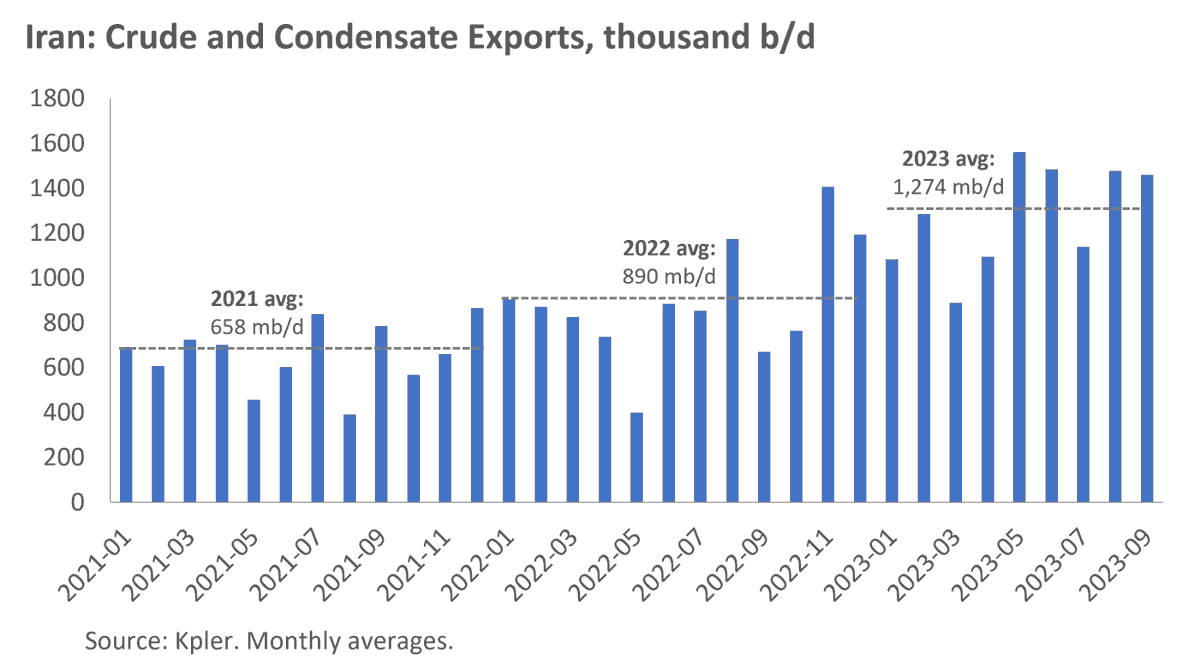
— IMF urges central banks to keep a grip on monetary policy as it raises global inflation forecast from 5.2% to 5.8% next year, from 6.9% in 2023. The global inflation rate reached 8.7% in 2022, the highest level in decades, and is expected to remain above most central-bank targets in 2024.
The fund also slightly lowered its forecast for global growth next year to 2.9%, down from its previous estimate of 3.0%. It maintained its forecast for global real GDP growth in 2023 at 3.0%.
The IMF revised down its growth projections for China and the Eurozone while highlighting ongoing global economic challenges.
The IMF acknowledged that the global economy is recovering from various challenges, including the Covid-19 pandemic, Russia's invasion of Ukraine, and energy crises, but noted that diverging growth trends have resulted in "mediocre" medium-term prospects.
IMF Chief Economist Pierre-Olivier Gourinchas stated that while most forecasts point to a soft landing, the IMF remains concerned about risks associated with China's property crisis, volatile commodity prices, geopolitical tensions, and a resurgence in inflation. Additionally, the Israel-Palestinian conflict emerged as a fresh risk, though its impact on the global economy remains uncertain.
Gourinchas emphasized that rising oil prices could dampen global output and increase global inflation. A 10% increase in oil prices could reduce global output by about 0.2% in the following year and raise global inflation by approximately 0.4%.
Gourinchas characterized the global economy as "limping along" and expressed concerns about medium-term growth prospects, particularly for emerging economies.
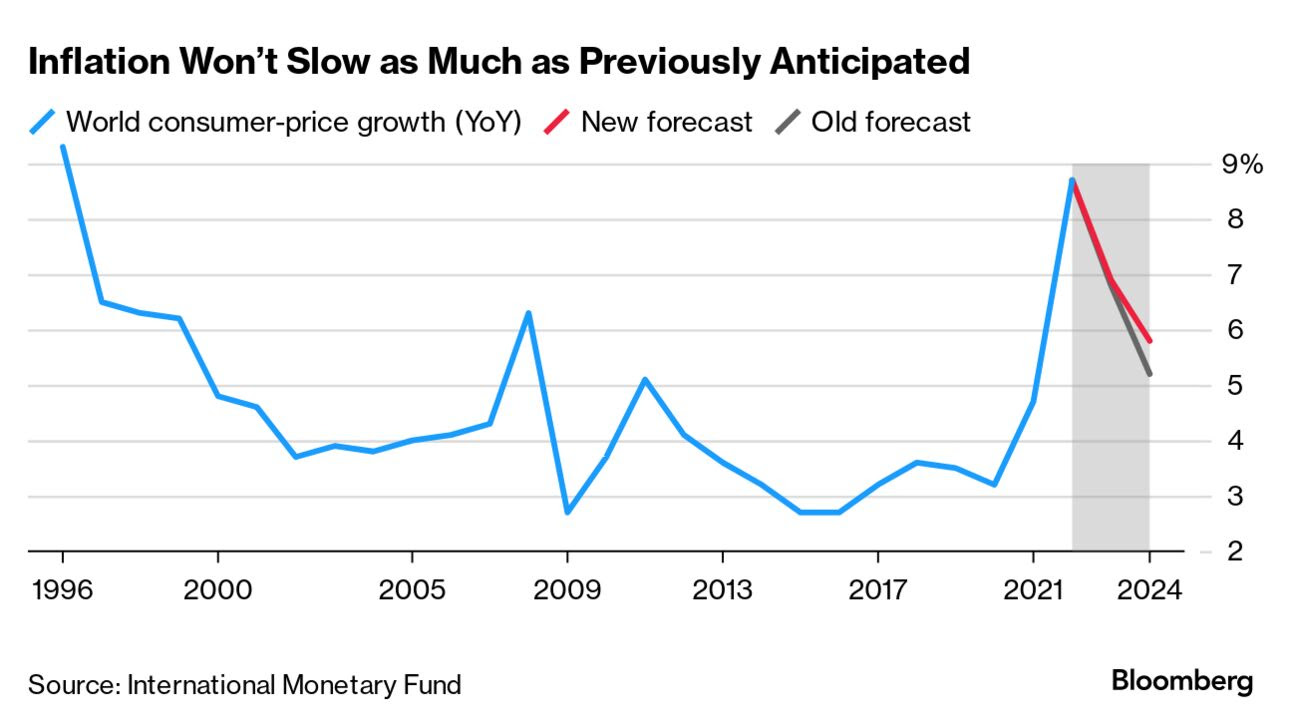
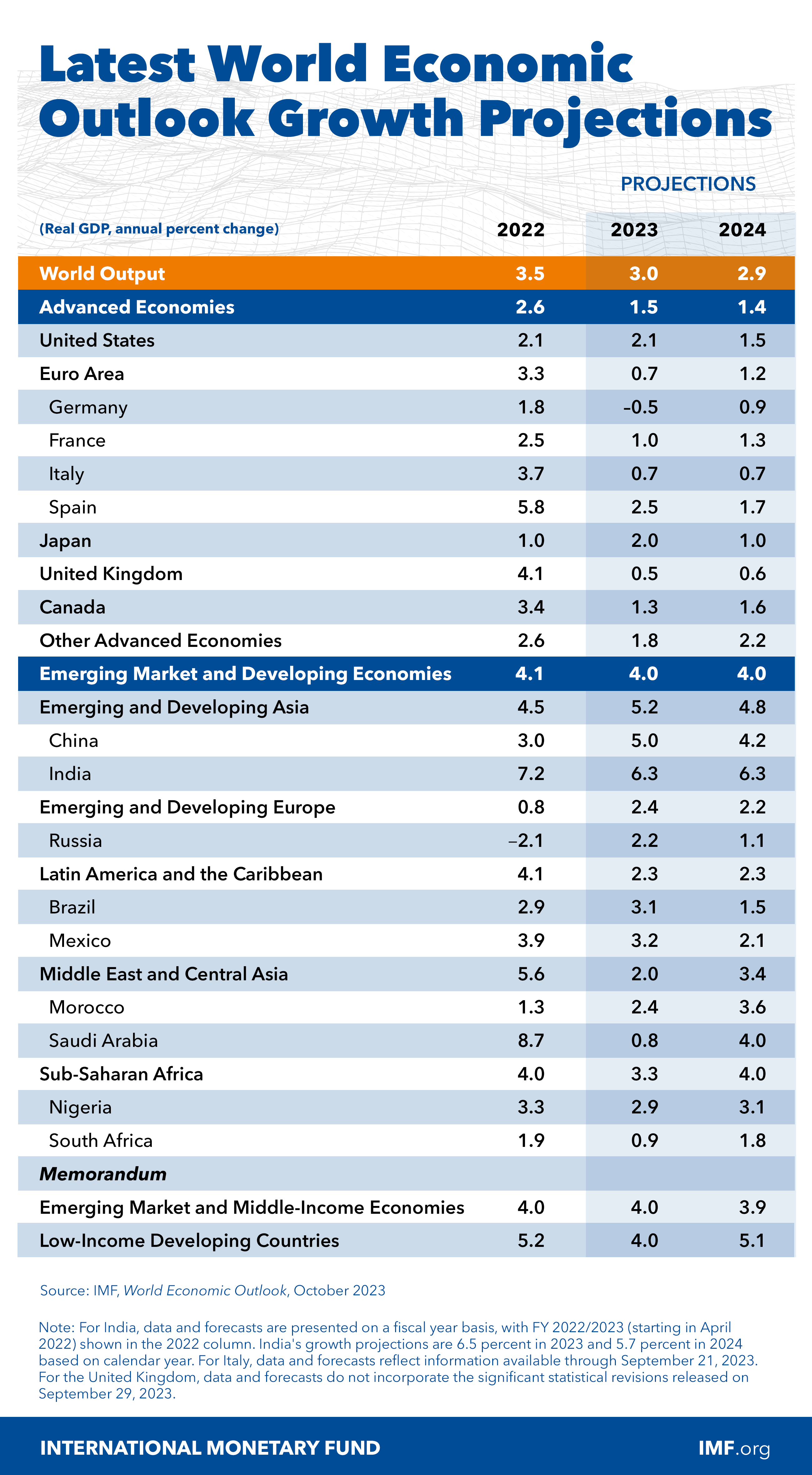
— Fed's caution grows as bond market signals possible end to rate hikes. Recent comments from Federal Reserve officials, including Fed Vice Chair Philip Jefferson and Dallas Fed President Lorie Logan, suggest that the U.S. central bank is closely monitoring the bond market's dynamics and may no longer feel compelled to raise interest rates. Rising yields in the bond market, which are increasing borrowing costs, have prompted the Fed to exercise caution in its rate-hiking decisions. However, both officials acknowledged that persistently high inflation remains a factor that could keep rate increases as a policy option in the future.
This shift in the Fed's tone comes as key economic data points are coming: The Consumer Price Index (CPI) and the Producer Price Index for Final Demand (PPI-FD) are set to be released this week, offering insights into inflation trends. Additionally, the release of the September Federal Open Market Committee (FOMC) meeting minutes is expected to provide further clarity on the central bank's stance on monetary policy.
Fed funds futures still overwhelmingly anticipate that the Fed will maintain interest rates in the range of 5.25% to 5.5% at its upcoming meetings. As the bond market reopens, the 10-year note yield is lower, reflecting the evolving landscape of monetary policy considerations.
— U.S. households hold $1 trillion in excess savings, potentially mitigating economic downturn. Revised government data has revealed that U.S. households have a significantly larger cash stockpile than previously estimated, offering a potential cushion to the economy in uncertain times. The data suggests that the total excess savings held by U.S. households amount to approximately $1 trillion, as estimated by Citi economist Robert Sockin. This substantial reserve of funds raises the likelihood of a softer economic landing, as Sockin suggests.
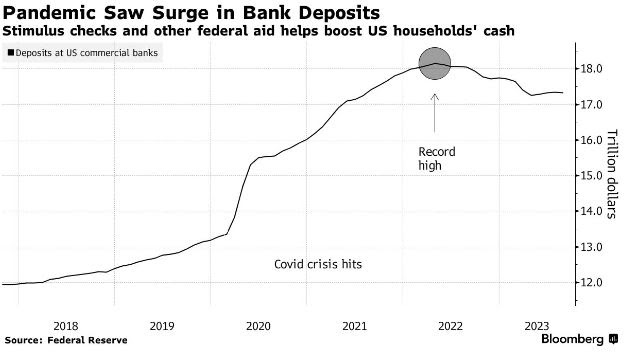
Market perspectives:
— Outside markets: The U.S. dollar index was weaker with strength in several currencies against the greenback. The 10-year U.S. Treasury note yield is lower, trading around 4.70%, off lows earlier in electronic trading as the market resumes trading after being closed Monday. There is a mixed tone in global government bond yields. Crude oil futures are lower, with U.S. crude around $86 per barrel and Brent around $87.75 per barrel. Gold and silver are mixed, with gold firmer around $1,869 per troy ounce and silver weaker around $21.84 per troy ounce.
— IEA predicts slower growth in global natural gas demand through 2026, highlighting China's role. The International Energy Agency (IEA) forecast a slowdown in the growth of global natural gas demand through 2026 (link). This prediction emphasizes the significant role that China plays in driving this demand. While consumption in mature markets, including North America, Europe, Japan, and Australia, peaked in 2021, nations in the Asia-Pacific, Africa, and the Middle East are expected to lead the growth in natural gas demand over the next few years. China alone is projected to account for almost half of the global increase in gas demand during this period. The IEA's outlook also raises questions about Europe's position considering the loss of Russian gas supplies and notes cautious optimism due to high storage levels in the European Union for the upcoming heating season.
— Iron ore prices have been rising despite challenges in China's property market. Prices have increased by about 20% since late May, surprising traders and indicating a temporary shift in trade dynamics, the WSJ reports (link). China, which produces over half of the world's crude steel, has been exporting more steel amid weaker domestic demand from the property sector. This has raised concerns about China's market power and its impact on global steel markets. Despite economic uncertainties, Chinese steel mills are operating at near-record levels, and iron ore stockpiles at major Chinese ports remain low.
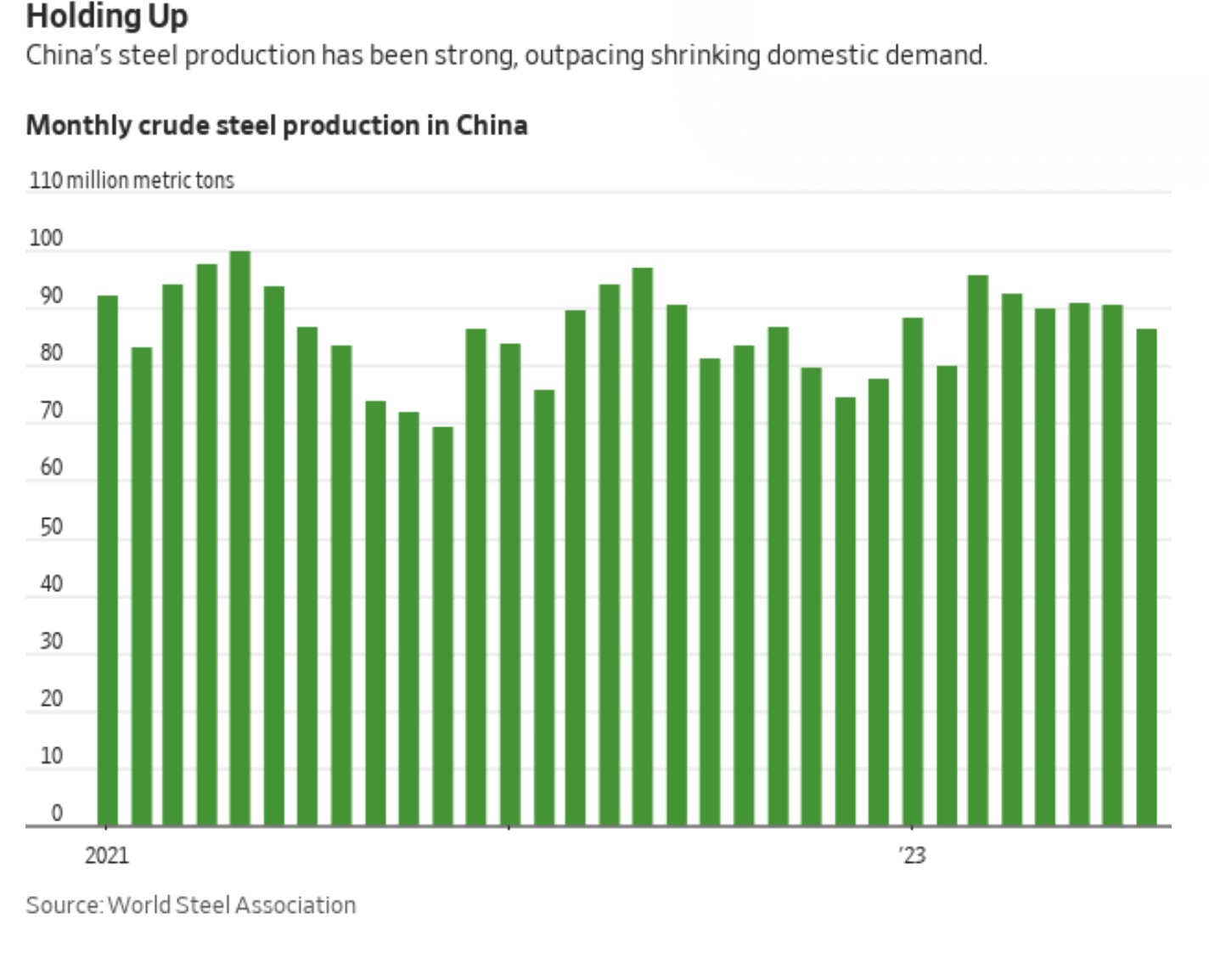
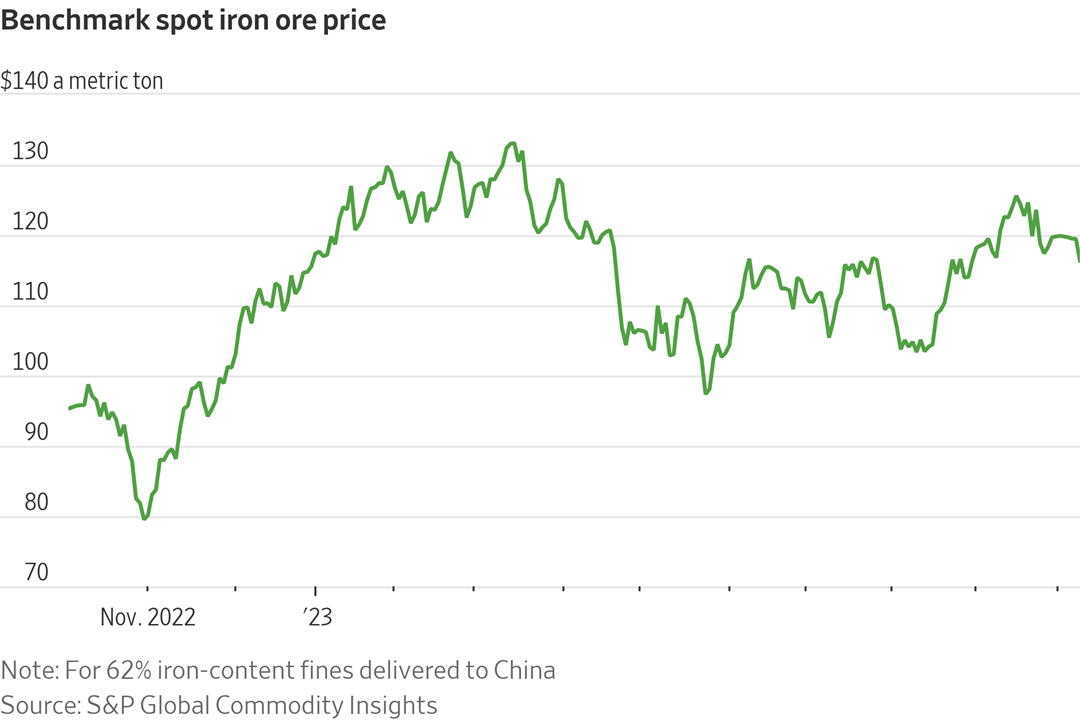
— World grain output increased. Pointing to "recent and more positive yield estimates" for wheat in Ukraine and Russia, the forecast for world grain production was raised to 2.819 billion metric tons, the highest ever, said the FAO Cereal Supply and Demand Brief (link).
— Ag trade update: South Korea purchased 138,000 MT of corn — one cargo optional origin and the other from South America or South Africa. Japan is seeking 90,640 MT of milling wheat in its weekly tender. Algeria tendered to buy up to 120,000 MT of corn from Brazil or Argentina.
— NWS weather outlook: Colder and unsettled weather to move east from the Pacific Northwest and northern California through mid-week while above average temperatures shift into parts of the Great Plains... ...Surge of tropical moisture to bring an increased threat for heavy rain and flash flooding for portions of the Gulf Coast through Wednesday.
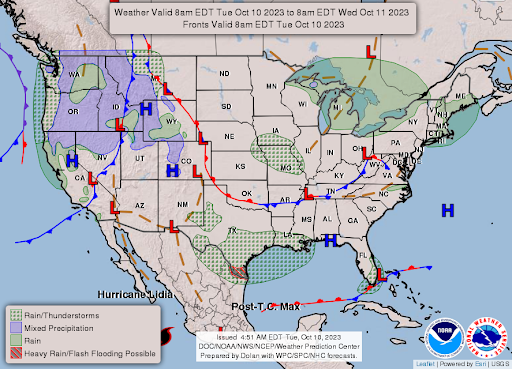
Items in Pro Farmer's First Thing Today include:
• Grains weaker overnight
• Tensions escalate in Gaza conflict
• IMF: Global economy ‘limping along’
|
ISRAEL/HAMAS CONFLICT |
— Israel discovers 1,500 Hamas militant bodies; tensions escalate in Gaza conflict. The Israeli Defense Forces (IDF) reported the discovery of the bodies of 1,500 Hamas militants within Israeli territory, marking a significant development in the ongoing conflict in the Gaza region. Israel stated that it has regained control of the border with Gaza and reported no recent incursions over the past day. Earlier, Hamas had issued a threat, stating its intention to execute Israeli captives if Israel continued to carry out airstrikes on civilian houses in Gaza without prior warning. These statements heightened tensions in the already volatile region.
Death toll rising. Reports from Gaza officials indicate that the airstrikes have resulted in the deaths of at least 700 Palestinians, while in Israel, at least 900 people have been killed by militants from Gaza.
On Monday, Israel imposed what it termed a "complete siege" on the Gaza Strip, which included cutting off access to food, electricity, and fuel. Additionally, Israel called up 300,000 reservists, a move that suggests the possibility of a ground offensive in the conflict.

— Some U.S. lawmakers propose joint aid package for Israel and Ukraine amid some pushback. A group of U.S. lawmakers suggested that the Biden administration pursue a joint aid package for both Israel and Ukraine, leveraging broad bipartisan support for Israel to overcome potential opposition from some Republicans regarding continued funding for Ukraine. The proposal was raised in discussions with White House officials over the weekend, with the goal of addressing the funding needs of both countries simultaneously.
White House officials said President Joe Biden could utilize existing authorizations to provide immediate assistance. Additionally, they emphasized the uncertainty of the extent of aid required by Israel following the recent attack by the Hamas militant group.
The idea of linking aid for both nations is already facing challenges in Congress, as some House Republicans argue that assistance for Israel and Ukraine should be addressed separately.
— Fertilizer makers surge amid concerns over impact of Israel conflict on global supplies. Fertilizer manufacturers experienced a significant uptick in their stock prices following a surprise attack by Hamas on Israel, which has raised concerns about the potential impact of the conflict on global fertilizer supplies crucial for food crop growth.
The conflict has disrupted operations at Israel's Port of Ashdod, a vital hub for the country's potash fertilizer exports. This disruption has placed approximately 3% of the global potash supply at potential risk, according to Ben Isaacson, an analyst at Scotiabank.
Of note: If Iran, a major nitrogen exporter in the region, becomes involved in the conflict, it could lead to supply constraints and potential price spikes for nitrogen-based fertilizers, which are essential for grain production. These price spikes could be exacerbated by increased premiums in benchmark Dutch TTF natural gas, a key component in nitrogen-based fertilizer production.
Impacts: In response to these concerns, Nutrien Ltd., the world's largest potash producer, saw its stock rise by as much as 4.2%, the most since July. CF Industries Holdings Inc., a leading nitrogen producer, gained as much as 6.2%, marking its most significant increase in over a month. Mosaic Co. also experienced an intraday gain of as much as 6.7%, the largest in nearly a year.
A nearly 10% surge in European natural gas prices, prompted by a pipeline leak in the Baltic, was already anticipated to result in firmer nitrogen prices later in the year.
|
RUSSIA/UKRAINE |
— U.S. prepares crackdown on evasion of sanctioned Russian oil price cap. The U.S. is gearing up to address violations of its primary sanction on the Russian oil industry by enforcing the $60-a-barrel price cap that was imposed by the U.S. and its allies. Treasury Secretary Janet Yellen emphasized in an interview (link) that the U.S. is very likely to take action to ensure compliance with the price cap. Yellen stated that the U.S. is closely examining enforcement measures and aims to convey the seriousness of adhering to the price cap to market participants. She emphasized that the U.S. is resolute about upholding the cap and will act against any Western services that are involved in violating it. Russia has managed to sell its crude oil above the $60 limit for several weeks, leading to concerns that some firms may be evading the cap through fraudulent means.
The Justice Department has also launched an extensive effort to crack down on violations of sanctions imposed on Russia's energy exports and is investigating the activities of a prominent oil trader.
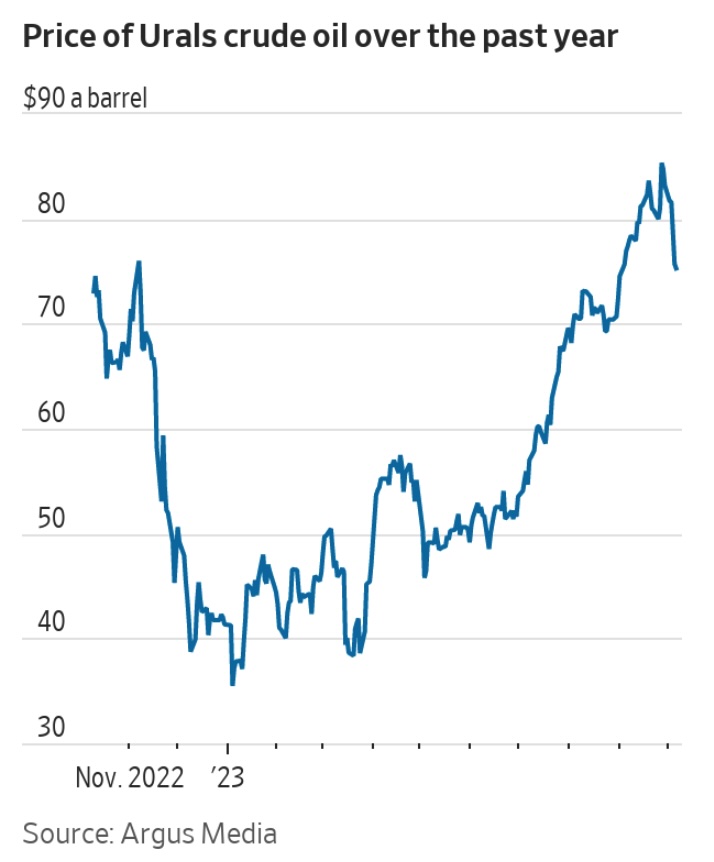
— U.N. held talks in Russia regarding grain, fertilizer exports. Top United Nations trade official Rebeca Grynspan met with Russian officials in Moscow on Monday for talks aimed at enabling the “unimpeded access” to global markets for grain and fertilizer from Russia and Ukraine. U.N. aid chief Martin Griffiths also attended the meetings virtually, U.N. spokesperson Stephane Dujarric said. U.N. Secretary-General Antonio Guterres “continues in his determination to facilitate the unimpeded access to global markets for food products and fertilizers from both Ukraine and the Russian Federation,” Dujarric said.
— Ukraine’s winter wheat seedings pass halfway point. Ukraine’s ag ministry said farmers had sown around 3.7 million hectares of winter crops as of Oct. 9, including 2.35 million hectares of winter wheat, 1.1 million hectares of winter rapeseed and 171,300 hectares of winter barley. The wheat plantings represented 54% of the expected area for 2023-24. Ukrainian weather forecasters have said the prolonged absence of rain in most Ukrainian regions had created unfavorable conditions for sowing and development of winter crops and Agriculture Minister Mykola Solsky said last week Ukraine was likely to sow less winter wheat than it initially expected.
— A Russian court upheld the detention of Wall Street Journal reporter Evan Gershkovich, denying his lawyers’ latest appeal to free him since he was taken into custody during a reporting trip in Russia.
— Ukraine farmland abandoned in war. A new analysis by NASA's Harvest program and shared exclusively with NPR (link) shows that between 5.2 and 6.9 million acres (2.1-2.8 million hectares) of prime farmland have been abandoned as a result of the war since 2021. The abandoned fields represent between 6.5 and 8.5% of Ukraine's total cropland. The losses represent "a massive amount of land," says Inbal Becker-Reshef, the program director for NASA Harvest and a research professor at the University of Maryland and the University of Strasbourg in France. Much of the fallow land lies in a vast swath along the front line of the war, while other fields are in areas recently retaken by Ukrainian forces, she says.
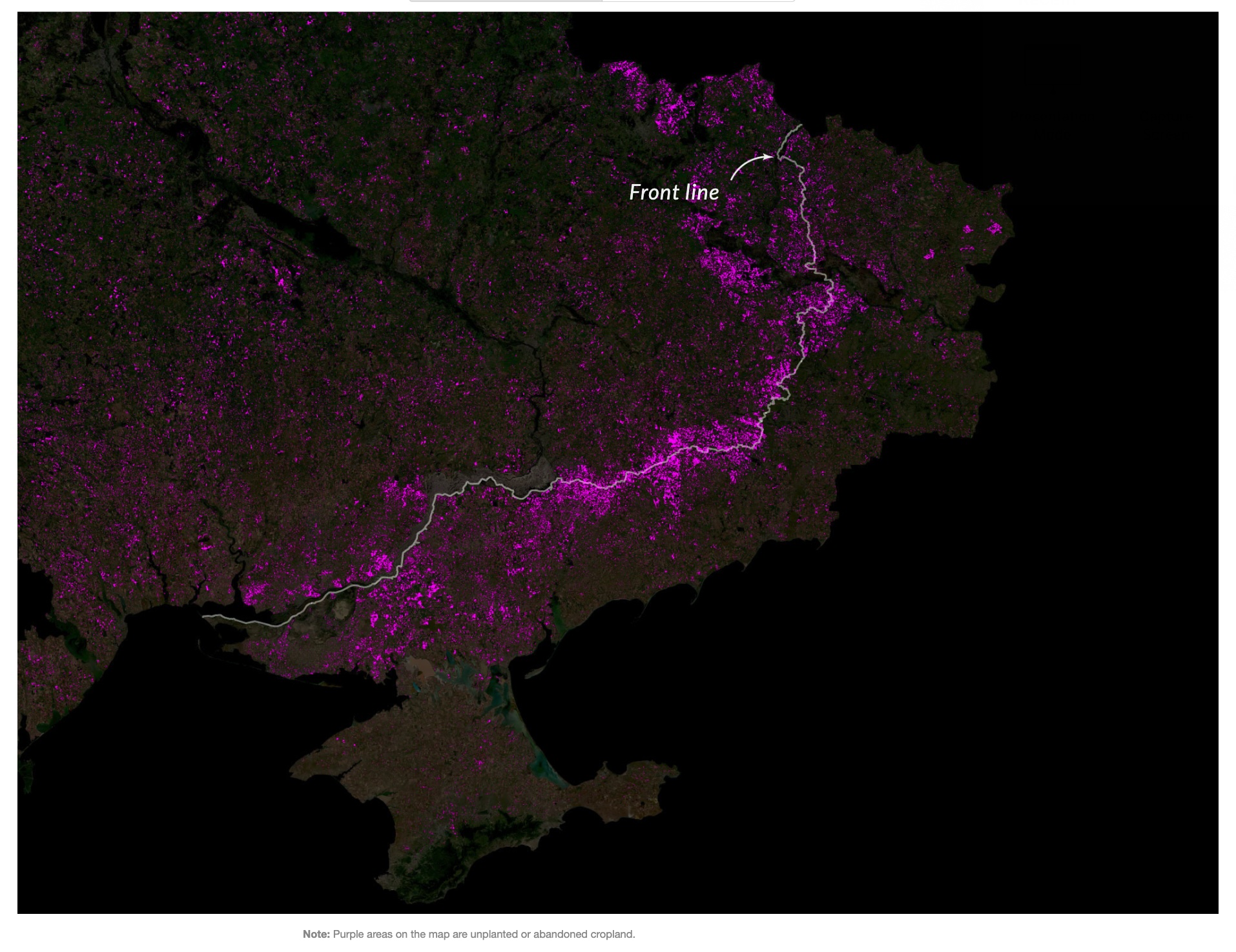
|
POLICY UPDATE |
— Potential tax changes as 2017 cuts approach expiration. As many provisions of the 2017 tax overhaul law are set to expire at the end of 2025, retirees and near-retirees are being advised to consider their tax strategies. Key recommendations from financial advisers include:
- Income Taxes: Income-tax brackets are expected to revert to pre-2017 levels in 2025, affecting most taxpayers. Retirees near their peak earnings level could see the highest income-tax increase. Advisers suggest considering a Roth IRA conversion now to take advantage of lower tax rates.
- Estate Taxes: The estate-tax exemption for individuals and couples may be reduced significantly if the tax law expires. Advisers recommend creating trusts to transfer assets that might be subject to taxes after 2025.
- Gifts: Individuals and couples can reduce their taxable estates by giving away money and assets while alive. Special rules for "529" education-savings plans and strategic gifting can help shrink taxable estates.
- Charitable Giving: The tax law increased the annual deduction limit for cash contributions to public charities. Consider making significant cash donations to charities now to maximize deductions.
Financial advisers stress the importance of acting promptly, as Congress may or may not extend these tax cuts, and procrastination could result in significant financial consequences.
|
CHINA UPDATE |
— China's Commerce minister expresses concerns over trade and tech restrictions to U.S. Senate Majority Leader. China's Commerce Minister, Wang Wentao, voiced specific concerns regarding American restrictions on trade and technology during a meeting with visiting U.S. Senate Majority Leader Chuck Schumer (D-N.Y.) in Beijing, according to a statement by China's Ministry of Commerce. The discussions, described as "rational and pragmatic," centered on the need for the U.S. to precisely define security boundaries, avoid overgeneralizing and politicizing security issues, and refrain from weaponizing commerce and trade activities with China.
Wang emphasized the importance of fair treatment for Chinese companies investing in the U.S., stating that competition should be based on international economic and trade rules and should be fair and constructive. He expressed China's willingness to collaborate with the U.S. to create a favorable business environment that could boost bilateral trade.
Schumer expressed Washington's desire to strengthen communication and exchanges with Beijing. He highlighted bipartisan support for maintaining and enhancing the bilateral economic and trade relationship, emphasizing that there is no intention of "decoupling" from China.
Before the U.S. delegation's departure for China, the U.S. Commerce Department added 42 more Chinese companies to its export blacklist, accusing them of offering technical support to Russia's invasion of Ukraine, a move that was strongly condemned by Beijing.
Concerns about trade restrictions were also discussed during the delegation's meeting with Chinese President Xi Jinping, who emphasized that the two countries do not necessarily have to head toward confrontation, highlighting the deep interdependence of their economies. The U.S. senators emphasized the need for a level playing field and urged China to remove restrictions and open its markets to U.S. companies, particularly in the semiconductor, financial services, and aerospace industries. In recent months, China has imposed restrictions on several U.S. companies over security concerns.
— Chinese property developer Country Garden announced it anticipates being unable to meet its offshore payment obligations, marking its first-ever default. The company has taken the step of appointing financial and legal advisers to assess its capital structure and liquidity. Country Garden's financial struggles have garnered significant attention, serving as a symbol of the broader property debt crisis in China. This crisis has raised concerns about its potential impact on social stability within the country.
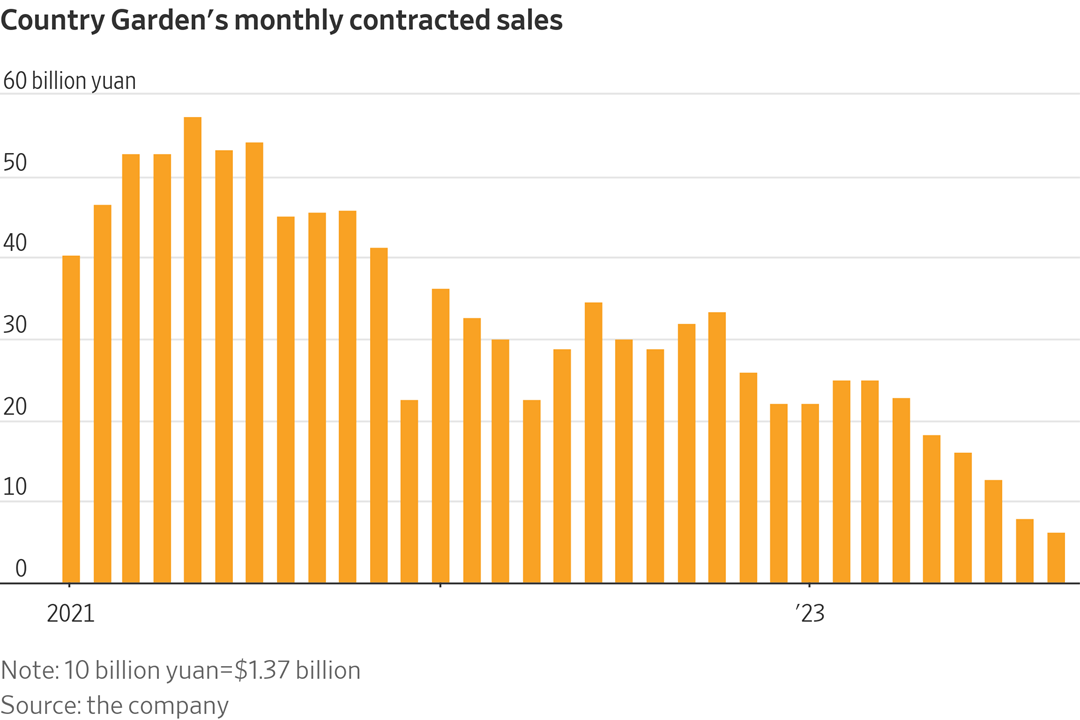
— China mulls raising 2023 budget deficit to bolster economy amid growth concerns. China is contemplating an increase in its 2023 budget deficit as part of a new stimulus plan aimed at aiding the economy in meeting its official growth targets, Bloomberg reports (link). Policymakers are reportedly considering the issuance of at least 1 trillion yuan (approximately $137 billion) in additional sovereign debt to finance infrastructure projects, such as water conservancy initiatives. This move could potentially push the annual budget deficit beyond the 3% limit set earlier this year. This potential stimulus marks a shift in Beijing's approach, as it has thus far avoided broader fiscal measures despite a deepening property crisis and rising deflationary pressures that threaten the targeted growth rate of around 5% for the year.
The news had immediate financial market reactions, with the offshore yuan rebounding and government bond yields rising slightly. Market participants are watching closely for the official announcement, which could come as early as this month.
Timeline: The plans, spearheaded by the Ministry of Finance and the National Development and Reform Commission, still require final approval from the State Council and legislators. Despite the potential increase in the budget deficit, experts emphasize that the central government's debt ratio remains relatively low, and its balance sheet remains healthy.
Of note: China's National Bureau of Statistics will conduct a nationwide sample survey in November to help better plan population policies, in an unexpected poll as authorities struggle to boost the country's flagging birth rate.
|
TRADE POLICY |
— Export restrictions imposed by economies on food, feed and fertilizers — which had been increasing since 2020 — are still high, contributing to supply uncertainty, price volatility and a worsening food security crisis, according to a World Trade Organization report.
Meanwhile, food inflation remains elevated globally, the World Bank’s latest update shows (link).
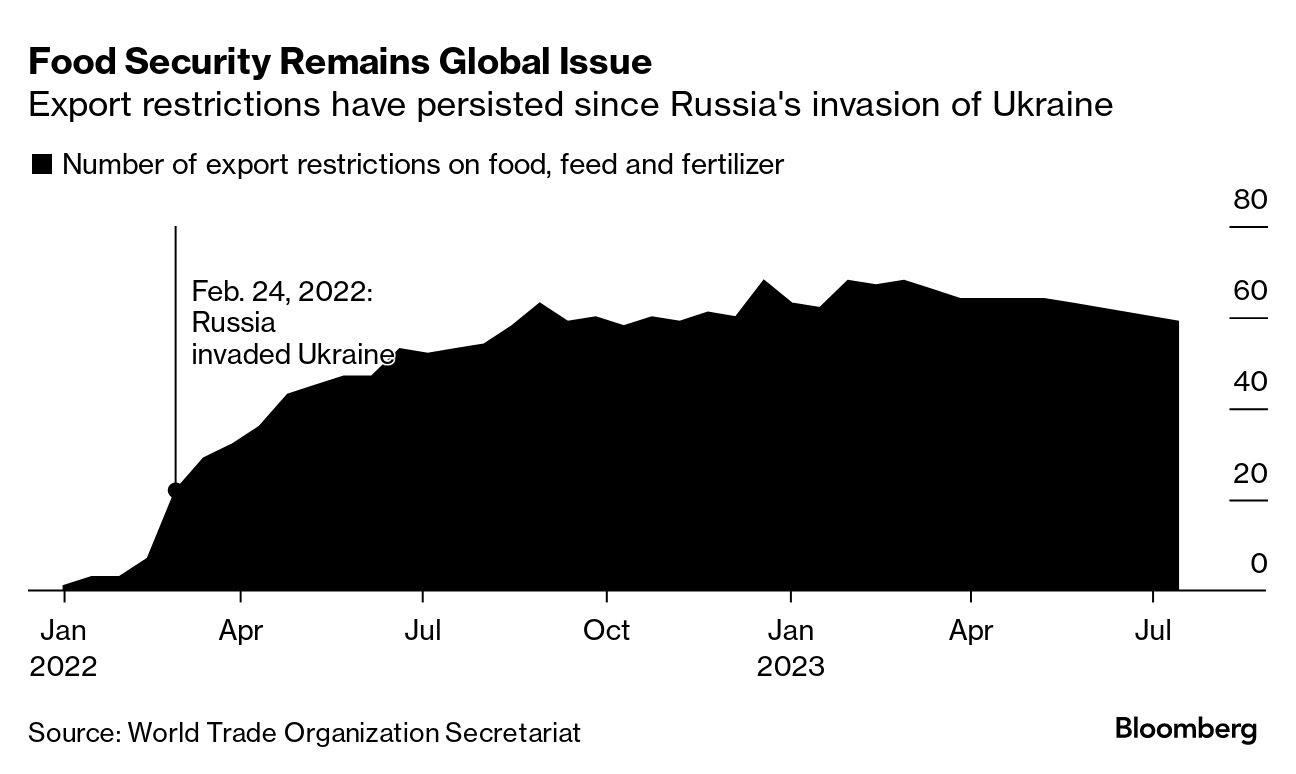
— GOP lawmakers urge Biden administration to halt proposed tariff increase on Russian fertilizer. A group of Republican lawmakers, including Senate Ag Committee Ranking Member John Boozman (R-Ark.), has sent a letter to Commerce Secretary Gina Raimondo urging the Department of Commerce to reconsider plans to raise countervailing duties (CVDs) on Russian phosphate fertilizer. In May, the Commerce Department's International Trade Administration proposed increasing the duties from 9.19% to 53.29%. The lawmakers questioned the methodology used in the tariff review, expressing concerns that it may have been based on an insufficient and unrepresentative dataset. They argued that raising the duties could negatively impact American farmers, compromising productivity and global food security. Phosphate fertilizers are a significant input cost for farmers, and the tariff increase could worsen the already tight supply situation.
|
LIVESTOCK, FOOD & BEVERAGE INDUSTRY |
— California Governor Gavin Newsom signed a bill into law that bans several food chemicals, including brominated vegetable oil, potassium bromate, propylparaben, and red dye No. 3. This move puts California ahead of the FDA and could inspire other states to take similar actions until the FDA updates its regulations.
Food safety advocates have criticized the FDA for not taking action on these chemicals, particularly red 3, which was found by the FDA decades ago to have carcinogenic properties. Last year, several groups, including the Center for Science in the Public Interest (CSPI), petitioned the FDA to remove red 3 from the list of approved color additives.
CSPI praised California's new law, emphasizing that a known carcinogen is banned in products like lipstick but remains widely used in thousands of foods, including many marketed to children. However, the National Confectioners Association expressed concerns, stating that California's decision undermines consumer confidence and creates confusion around food safety, suggesting that the FDA could prevent this by engaging on the topic.
— Smithfield to close North Carolina plant but transfer production to another site. Smithfield Foods will close its Charlotte, North Carolina, pork-processing plant and transfer production to its Tar Heel, North Carolina, facility to increase efficiency and better utilize existing capacity. Tyson and Perdue Farms are also shuttering some plants due to declining demand and persistent cost challenges.
— U.S. pork exports maintain steady performance, led by strong demand in Mexico, while beef exports show improvement in August. In August, U.S. pork exports remained steady compared to the previous year, with robust demand from Mexico playing a crucial role, according to data from the USDA and the U.S. Meat Export Federation (USMEF). However, the export value dipped slightly. Beef exports, on the other hand, were lower than the substantial totals recorded in August 2022 but showed signs of improvement compared to July.
In detail, August pork exports amounted to 226,519 metric tons (mt), which was on par with the previous year. However, the export value decreased by 1.5% to $649.5 million. Over the first eight months of 2023, pork exports were 11% higher than the same period the previous year, totaling 1.91 million mt and valued at $5.32 billion, representing a 9% increase.
Mexico's significant demand for U.S. pork was highlighted, with USMEF President and CEO Dan Halstrom emphasizing its crucial role in generating revenue for the U.S. pork industry. Moreover, demand for U.S. pork was growing in other Western Hemisphere destinations, and gains were being achieved in various Asia-Pacific markets.
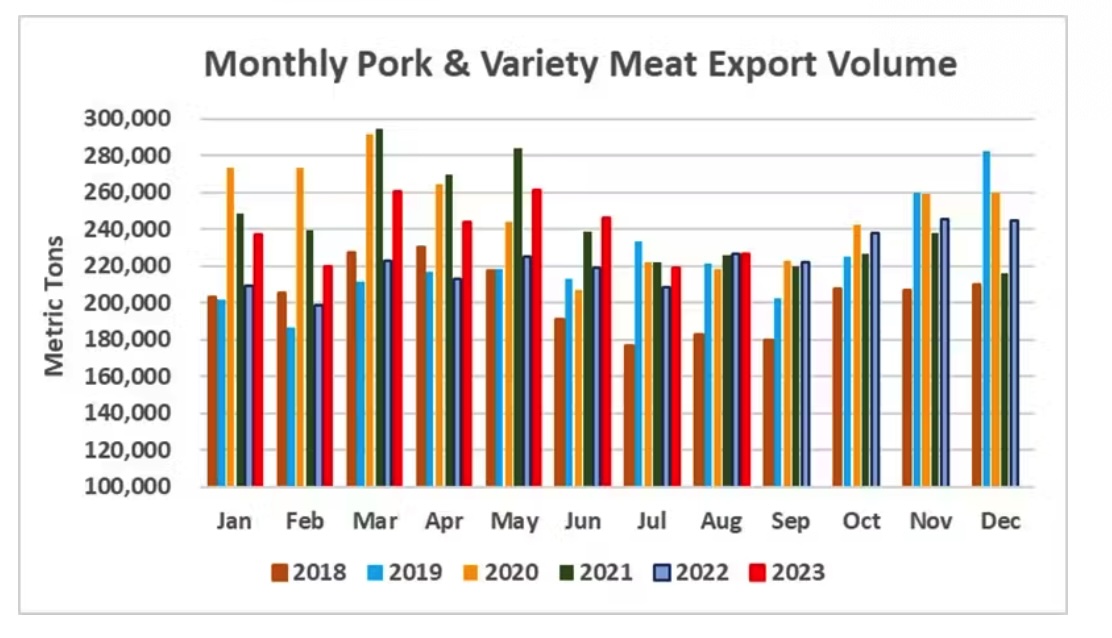
As for beef exports in August, they totaled 109,000 mt, marking a 19% decrease compared to the previous year, which had recorded the second-highest export volume on record. However, there was a 6% increase compared to July. The export value in August was $883.9 million, reflecting a 15% decline year-on-year but a 9% rise compared to July. For the first eight months of the year, beef exports were behind last year's record pace by 12% in volume (881,343 mt) and 19% in value ($6.69 billion).
Halstrom noted that beef exports faced challenges, particularly in large Asian markets where the recovery of the foodservice sector was slow, and consumer confidence remained low due to rising prices and a strong U.S. dollar. Nevertheless, exports to South Korea and Japan improved somewhat after a challenging July. Mexico continued to be a significant bright spot for U.S. beef, and exports to other Western Hemisphere partners in Central and South America, along with the Dominican Republic, gained momentum in August.
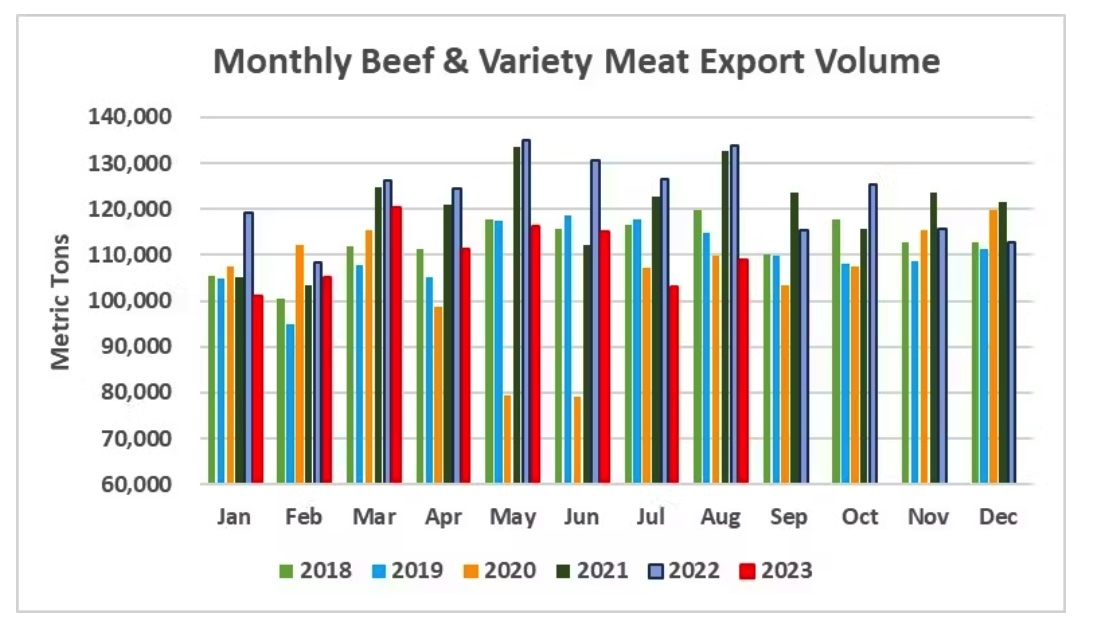
|
POLITICS & ELECTIONS |
— Former Dodgers star Steve Garvey enters U.S. Senate race. Steve Garvey, a former All-Star first baseman for the Dodgers, announced Tuesday that he is running for the U.S. Senate seat held by the late Dianne Feinstein, a gambit by a political newcomer banking on his baseball fame and affable demeanor to overcome the long odds Republicans face in this solidly Democratic state. Link to details via the Los Angeles Times.
— As expected, Robert Kennedy Jr. is running for president as an independent. The vaccine skeptic and conspiracy theorist ended his long shot bid to challenge President Biden for the Democratic nomination, setting up an expensive campaign to get on ballots in all 50 states. Kennedy’s move drew opposition from Republicans who fear he could siphon support from their eventual candidate.
— Former Texas Rep. Will Hurd dropped out of the 2024 Republican presidential race and endorsed former South Carolina Gov. Nikki Haley. Hurd expressed concerns about his party nominating Donald Trump or Trump-like candidates, warning of potential losses. Nikki Haley's campaign gained momentum with $11 million raised in the third quarter, positioning her as a leading Trump rival in the GOP field.
|
OTHER ITEMS OF NOTE |
— President Biden was interviewed as part of an investigation into his handling of classified documents by Special Counsel Robert Hur, the White House counsel's office said on Monday. Hur is expected to draft a report of his findings, which he will likely seek to release months before the 2024 election to avoid any perception of the Justice Department attempting to influence the presidential race.
Former President Donald Trump was never interviewed by special counsel Robert Mueller during the investigation into alleged Russian interference in the 2016 election despite extensive negotiations over a potential interview.
— Calendar of events today include:
Tuesday, Oct. 10:
- Federal Reserve. Fed Governor Christopher Waller speaks on the Evolution of Monetary Policy in Washington; Atlanta Fed President Raphael Bostic, Minneapolis Fed President Neel Kashkari, and San Francisco Fed President Mary Daly scheduled to speak.
- Global economy. IMF issues its latest World Economic Outlook.
- IMF/World Bank related events. Atlantic Council holds a virtual discussion with several officials as part of the 2023 annual meetings of the World Bank and International Monetary Fund, including Angolan Finance Minister Vera Esperanca Dos Santos Daves De Sousa; Peru's Central Bank Governor Julio Velarde Flores; European Bank for Reconstruction and Development President Odile Renaud-Basso; a discussion on "What's Next for Countries Facing Debt Distress?”
- Trade policy. Center for American Progress (CAP) holds a discussion on "President Biden's Worker-Centered Trade Policy." US Trade Representative Katherine Tai speaks.
- Global trade. Asia Society Policy Institute holds a virtual discussion, beginning at 1 p.m., on "The Global Trade Paradigm."
- Broadband. Semafor discussion on "Igniting Innovation: America's Digital Future - Debating the Broadband Connectivity Challenge."
- Environmental Modeling meeting. Environmental Protection Agency Environmental Modeling meeting on presentations and discussions on surface water and groundwater modeling and endangered species assessment modeling and other matters.
- International economy. Center for Global Development (CGD) holds a virtual discussion on "Strengthening International Cooperation in a Fragmenting Global Economy."
- MENA situation. Middle East Institute (MEI) holds a virtual discussion on "Structural Reforms to Reinvigorate Growth in the Middle East and North Africa (MENA)."
- Russia/Ukraine situation. Atlantic Council virtual discussion on "Protecting US interests: How to defeat Putin and set Ukraine on the path to NATO."
- Lessons from Ukraine in the Pacific. Defense One discussion with Army leaders on lessons learned from Ukraine and "how it affects the service's strategies and readiness in the Pacific."
- Economic reports. NFIB Small Business Optimism Index
- Energy reports. Holiday: Taiwan.
- USDA reports. AMS. Export Inspections ERS: US Agricultural Trade Data Update NASS: Crop Progress
|
KEY LINKS |
WASDE | Crop Production | USDA weekly reports | Crop Progress | Food prices | Farm income | Export Sales weekly | ERP dashboard | California phase-out of gas-powered vehicles | RFS | IRA: Biofuels | IRA: Ag | Student loan forgiveness | Russia/Ukraine war, lessons learned | Russia/Ukraine war timeline | Election predictions: Split-ticket | Congress to-do list | SCOTUS on WOTUS | SCOTUS on Prop 12 pork | New farm bill primer | China outlook | Omnibus spending package | Gov’t payments to farmers by program | Farmer working capital | USDA ag outlook forum | Debt-limit/budget package |


